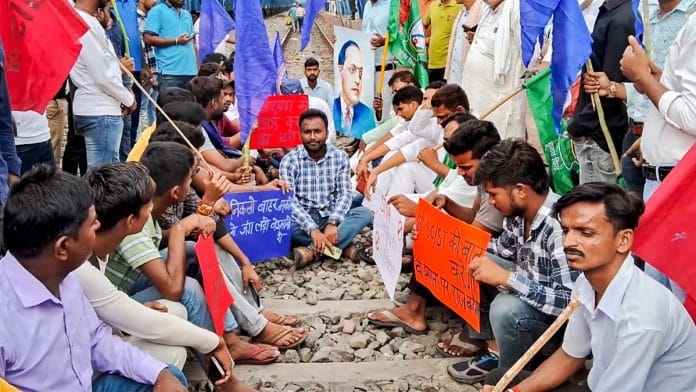Thank you dear subscribers, we are overwhelmed with your response.
Your Turn is a unique section from ThePrint featuring points of view from its subscribers. If you are a subscriber, have a point of view, please send it to us. If not, do subscribe here: https://theprint.in/subscribe/
On July 9, India witnessed yet another Bharat Bandh, called by a coalition of ten central trade unions and supported by several farmer organizations. The demands — resist labour reforms, stop privatization, expand MGNREGA, halt contractual hiring, and fill government vacancies — read like a manifesto frozen in time. This is not a recipe for inclusive growth; it’s a refusal to evolve.
Let’s not pretend this is about workers’ rights alone. This is about resisting much-needed structural reforms that India urgently needs if it is to compete in a borderless, investment-driven global economy. In today’s interconnected world, where money, manufacturing, and talent move swiftly across geographies, India cannot afford to operate in an ideological silo.
India Must Compete, Not Cocoon
The Bharat Bandh protests highlight a deeply troubling contradiction: unions demand job creation while simultaneously opposing the very reforms that enable jobs to be created.
Reforms are not anti-worker — they are pro-employment. They provide the agility, transparency, and confidence that both domestic and international businesses need to expand operations and hire talent. Rigid labour laws, by contrast, discourage growth, innovation, and risk-taking.
If we want to attract global manufacturers away from China and integrate into global supply chains, we must provide a policy and regulatory environment that rewards investment, not punishes it with red tape, militant unions, and retrograde demands.
Capital Has No Nationality — It Goes Where It Is Welcomed
India must internalize a hard truth: Capital is mobile. Both Indian companies and foreign investors today have choices. If they don’t find a stable, reform-friendly ecosystem in India, they will invest in Vietnam, Indonesia, Bangladesh, or Eastern Europe. And they already are.
Global funds and strategic investors assess labour flexibility, legal certainty, ease of hiring and firing, and long-term policy consistency. Bandh culture and anti-reform protests only amplify the perception that India is still struggling to make up its mind — does it want to grow fast, or cling to slogans from the past?
We can’t have it both ways. We cannot claim to be the world’s next manufacturing hub while sending the message that reform is negotiable and strikes are acceptable instruments of policy resistance.
Privatization: A Political Punching Bag, An Economic Necessity
One of the key demands of the protestors is to halt privatization. But this debate is settled in most of the world — privatization is not a betrayal of the people, it is an upgrade of the system. Many Indian PSUs have outlived their utility, are fiscally unsustainable, and continue to deliver subpar services at massive public cost.
Privatization allows for better governance, customer focus, and innovation. It is not a rejection of public interest; it is a recognition that public interest is best served when outcomes, not ownership, are prioritized.
Youth Need Jobs, Not Jargon
The most cynical part of these protests is that they claim to speak for the unemployed. Yet, what young India needs today is skills, startups, scale, and stability — not more unproductive public jobs or strikes that disrupt economic activity.
You don’t create jobs by blocking investment. You create jobs by making India an irresistible magnet for entrepreneurs, innovators, and industrialists. That requires flexible labour laws, faster environmental clearances, better logistics, predictable tax regimes — not emotional appeals to Nehruvian-era protectionism.
India needs more factories, not more Bandhs. More sunrise sectors, not sunset ideologies.
Reforms Cannot Be Held Hostage
Let’s face it: Bharat Bandh is not just a protest — it is a proxy war against change. It’s the same old resistance to modernity we’ve seen since the 1991 reforms. Every time India has taken a step forward, a section has pulled it two steps back — in the name of the poor, but always at the cost of progress.
The world’s fastest-growing major economy cannot afford to be derailed by institutionalized inertia. Reform is not optional. It’s existential. As NITI Aayog once warned, “If India fails to reform, it will fail to transform.”
No Nation Strikes Its Way to Prosperity
As we chase the $5-trillion economy vision, Bharat cannot afford a Bandh mindset. Dialogue is welcome. But dogmatic resistance to every meaningful policy shift cannot be treated as noble activism. It is economic vandalism.
As the saying goes, “When the wind of change blows, some build walls, others build windmills.” India must choose windmills. The future demands it.
To the unions: evolve, or be left behind. The India of 2025 is not the India of 1975. And it’s not waiting.
These pieces are being published as they have been received – they have not been edited/fact-checked by ThePrint.


